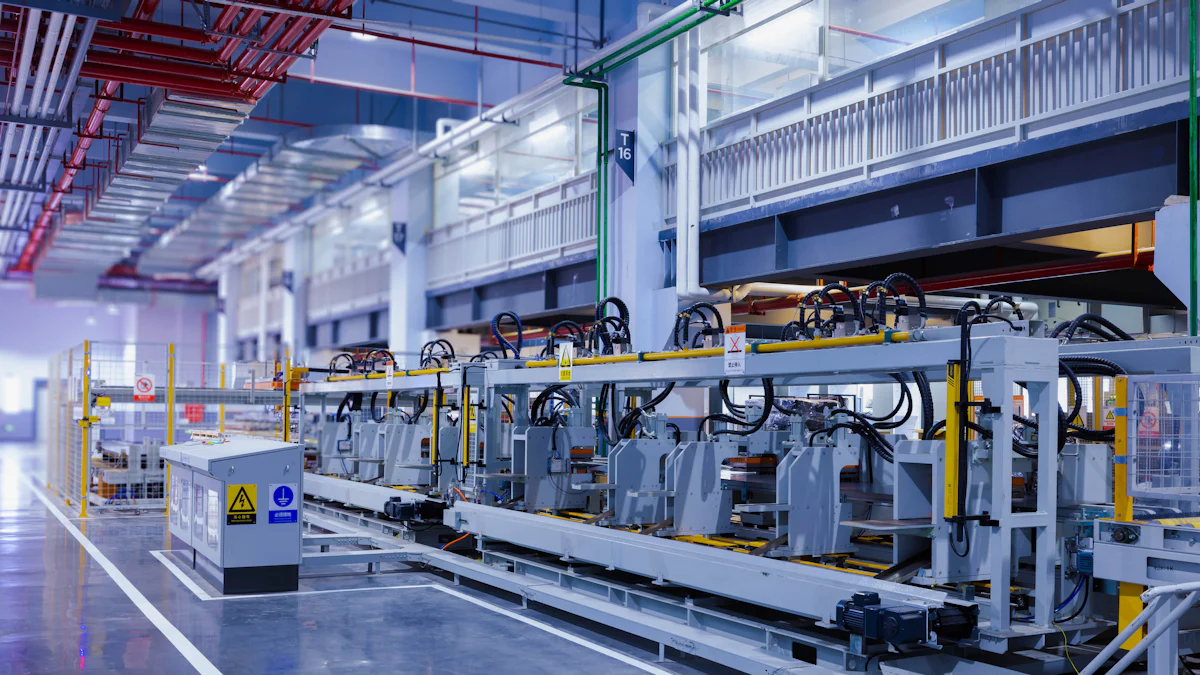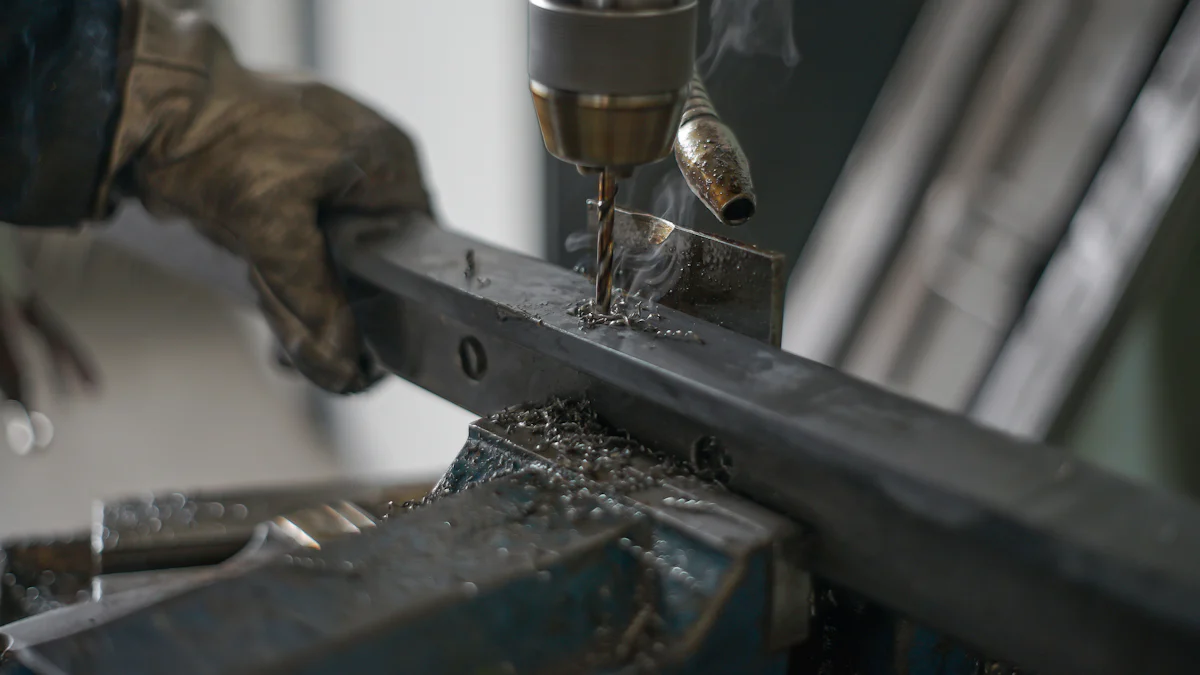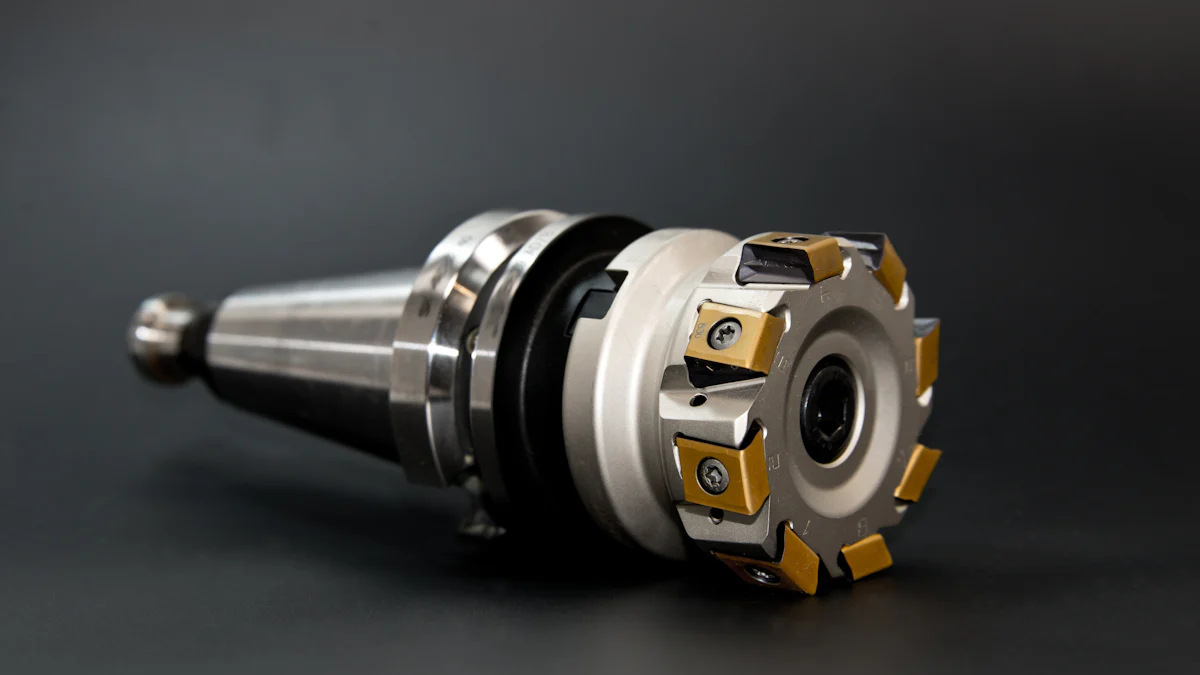Why CNC Machining Is the Best Choice for Your Custom Parts

When you need custom parts with a high level of dimensional accuracy, CNC machining stands out as the best option. This advanced process delivers unmatched precision, achieving tolerances as tight as 0.001 inches. It also supports manufacturing custom designs across industries like aerospace, medical, and automotive, where superior physical properties and high accuracy are critical. CNC prototype machining reduces waste and optimizes resources, making it cost-effective for both small-scale and large-scale projects. A reliable CNC machine shop can handle complex geometries and ensure consistent quality, whether you need a single custom-made CNC machined part or mass production.
Key Takeaways
CNC machining is very accurate, with tolerances as small as 0.001 inches. This makes it perfect for industries like aerospace and medical.
It works with many materials, like metals and plastics. This allows custom solutions for different project needs.
CNC machining creates less waste and uses resources wisely. This saves money for both prototypes and large-scale production.
The technology can handle small or large production runs. It keeps quality and efficiency high at every step.
CNC machining can make complex designs with advanced tools. It produces strong parts that work well in tough conditions.
Precision and Accuracy in CNC Machining

How CNC Machining Achieves High Precision
CNC machining delivers an exceptional level of precision that traditional manufacturing methods cannot match. With tolerances as tight as ±0.001 inches, this process ensures your custom parts meet exact specifications. Advanced technologies play a key role in achieving this accuracy. High-end software optimizes machining processes in real time, while automation technologies enhance repeatability. Multi-axis machining allows for the creation of intricate designs, and advanced tooling improves performance and durability. These innovations ensure consistent results, even for the most complex parts.
The integration of robotics and artificial intelligence further enhances precision. Robotics improves efficiency and reduces errors, while AI makes predictive adjustments during machining. This combination ensures that every part produced meets the highest standards of accuracy. Whether you need a single prototype or a large production run, a reliable CNC machine shop can deliver parts with unmatched precision.
Industries That Rely on Precision for Custom Parts
Many industries depend on CNC machining for its ability to produce high-precision components. Aerospace and medical sectors, for example, require parts with extremely tight tolerances to ensure safety and reliability. In aerospace, even the smallest deviation can compromise performance. Medical devices must meet strict specifications to function correctly and safely.
Other industries, such as automotive, defense, and energy, also rely on CNC machining for its precision. Automotive manufacturers use it to create engine components that demand exact measurements. Defense applications require reliable parts for critical systems. Even consumer goods and industrial equipment benefit from the accuracy CNC machining provides. Across all these sectors, precision is not just a preference—it is a necessity.
Versatility and Material Options for Custom Parts

Materials Compatible with CNC Machining
CNC machining supports a wide variety of materials, giving you the flexibility to choose the best option for your custom parts. Whether you need lightweight metals, durable alloys, or versatile plastics, CNC machining can handle them all. Here’s a quick comparison of some common materials:
Material | Cost per Pound | Performance Characteristics |
|---|---|---|
Aluminum | $1 - $6 | Lightweight, workable, very good machinability |
Steel | $0.30 - $6 | Durable, high strength, various grades and finish options |
Stainless Steel | $2 - $20 | Corrosion resistant, high strength, suitable for medical uses |
Brass | $3 - $10 | Excellent electrical conductivity, decorative applications |
Plastic | $1 - $7 | Versatile, affordable, used in various industries |
Each material offers unique benefits. Aluminum is lightweight and easy to machine, making it ideal for aerospace and automotive applications. Stainless steel provides excellent corrosion resistance, perfect for medical devices. Brass works well for electrical components, while plastics are affordable and adaptable for many industries. This versatility ensures that CNC machining can meet your specific needs, no matter the application.
Creating Complex Designs with CNC Machining
CNC machining excels at producing intricate geometries and complex designs. Advanced capabilities like multi-axis movements and precise tolerancing allow you to create parts with exceptional detail. Unlike traditional methods, CNC machining relies on computerized control, which eliminates human error and ensures consistent results. This makes it possible to achieve tighter tolerances and produce parts with unmatched precision.
Industries such as aerospace, medical, and automotive benefit greatly from this capability. For example, CNC machining is used to manufacture aerospace components, medical devices, and precision tooling. These parts often feature intricate designs that require high accuracy. Modern CNC technology also reduces the need for multiple setups, increasing efficiency and saving time.
If your project involves custom designs with complex geometries, CNC machining offers the perfect solution. Its ability to handle intricate details ensures that your parts meet the highest standards of quality and performance.
Consistency and Scalability in CNC Machining
Ensuring Consistent Quality Across Parts
CNC machining ensures consistent quality across all parts by combining advanced technology and rigorous processes. Automated systems follow the same precise steps for every part, eliminating variability. High-end CAD and CAM software convert your designs into exact machining instructions, reducing the chance of errors. State-of-the-art equipment operates with extreme precision, achieving tight tolerances that meet your specifications.
Real-time monitoring plays a critical role in maintaining consistency. Sensors track the machining process and detect deviations early, ensuring immediate corrections. Post-production inspections, such as coordinate measuring machines (CMM) and laser scanning, verify that each part meets the required standards. Skilled operators oversee these processes, ensuring flawless execution even for complex projects.
Quality control begins with raw material and tool inspections. First Article Inspection (FAI) confirms that initial parts meet design requirements. During production, in-process inspections monitor parameters to maintain compliance. Final inspections ensure that every part leaving the CNC machine shop meets your expectations. Statistical Process Control (SPC) adds another layer of reliability by using data to monitor and refine the machining process.
Scalability for Prototypes and Large-Scale Production
CNC machining adapts seamlessly from prototype production to large-scale manufacturing. For low-volume runs, it produces fewer than 1,000 parts, making it ideal for early-stage development or short lifecycle products. This approach reduces costs and allows for easy customization. High-volume production, on the other hand, focuses on creating 1,000 or more parts. It minimizes labor dependency, lowers costs, and ensures a steady supply of components.
Scaling production with CNC machining offers significant cost advantages. The process is less labor-intensive than manual methods, reducing expenses. As production volume increases, the cost per unit decreases dramatically. For example, a single part priced at $40 drops to $12.50 when producing 10 pieces and further reduces to $8.79 for 100 parts. This efficiency makes CNC machining a cost-effective solution for both prototypes and mass production.
Whether you need a single prototype or thousands of custom parts, a reliable CNC machine shop can meet your needs. Its ability to scale ensures that you receive high-quality components at every stage of production.
Cost-Effectiveness and Efficiency of CNC Machining
Reducing Waste and Optimizing Resources
CNC machining minimizes waste by using advanced technologies like CAD/CAM software. These programs determine the most efficient tool paths, machining techniques, and cycle times for your custom parts. This precision ensures that material is removed only where necessary, reducing scrap and maximizing resource usage. CNC simulation programs also allow manufacturers to test machining strategies before production begins. This step prevents errors and further reduces material waste.
Unlike traditional methods, CNC machining eliminates the need for handheld cutting tools. Operators program CNC machines with exact specifications, ensuring every cut and drilled hole aligns perfectly with your design. This accuracy reduces mistakes and prevents the need to discard materials due to cutting errors. Additionally, CNC machining’s ability to craft parts with minimal waste contributes to a smaller environmental footprint. By optimizing resources, you save on raw materials while supporting sustainable manufacturing practices.
Long-Term Cost Savings with CNC Machining
CNC machining offers significant long-term cost benefits for custom machining projects. Its precision and efficiency reduce production errors, saving you money on rework or material waste. The process is also highly economical for small-to-medium production volumes. For example, unit prices drop by up to 70% when ordering multiple identical parts. This makes CNC machining an excellent choice for prototypes and one-off custom parts.
As production volumes increase, the cost per part decreases further. Fixed costs, such as setup and tooling, are spread across more units, reducing overall expenses. Industries like aerospace, automotive, and medical have achieved substantial savings by leveraging CNC machining for high-precision components. Quick turnaround times also contribute to cost-effectiveness. Parts are often ready for delivery within five days, allowing you to meet tight deadlines without compromising quality.
By choosing a reliable CNC machine shop, you can balance volume and setup efficiency to optimize costs. Whether you need a single prototype or thousands of parts, CNC machining ensures high-quality results at a competitive price.
Customization and Flexibility in CNC Machining
Tailored Solutions for Unique Specifications
CNC machining offers unmatched flexibility when it comes to creating parts tailored to your unique needs. This process allows you to design components with specific dimensions, materials, and finishes, ensuring they meet your exact requirements. Industries that demand precision, such as aerospace and oil and gas, benefit greatly from this capability. For example:
In aerospace, CNC machining produces components that endure extreme conditions, such as high temperatures and intense pressure.
The oil and gas sector relies on CNC machining for durable, high-grade parts that withstand harsh environments.
Custom machining services provide flexibility in design and material selection, enabling you to create specialized components for any application.
This adaptability ensures that CNC machining can deliver solutions for even the most demanding projects. Whether you need intricate designs or robust materials, this process ensures your parts perform reliably in their intended applications.
Adapting to Industry-Specific Requirements
CNC machining excels at meeting the unique demands of various industries. Its precision and versatility make it indispensable for sectors like defense, energy, and aerospace. Here are some examples of how CNC machining adapts to specific requirements:
In the energy sector, it produces turbine components and valves for power generation and renewable energy systems.
The defense and aerospace industries rely on CNC machining for intricate designs, such as weapon bodies and missile components.
The oil and gas sector uses CNC machining to create high-precision parts that endure extreme conditions, including high pressure and corrosive environments.
These examples highlight the broad application range of CNC machining. Its ability to handle complex designs and demanding environments makes it a reliable choice for industries where precision and durability are critical. By choosing CNC machining, you ensure your parts meet the highest standards of quality and performance.
CNC machining stands out as the ultimate solution for your custom parts. Its precision ensures every component meets strict tolerances, vital for industries like aerospace and medical. The process adapts to unique designs and materials, offering unmatched flexibility. For example, aerospace components crafted from titanium or aluminum demonstrate CNC machining’s ability to handle extreme conditions. Companies like DAQRI and PAL-V have leveraged this technology to create innovative products, from AR hardware to flying cars.
You can rely on CNC machining for consistent quality and scalability. Integrated CAD/CAM systems streamline production, ensuring identical parts with tolerances as tight as a few micrometers. Whether you need prototypes or large-scale manufacturing, this process delivers high-quality results efficiently. Consider CNC machining for your next project to achieve precision, versatility, and cost-effectiveness.
FAQ
What is CNC machining, and how does it work?
CNC machining uses computer-controlled machines to create parts from raw materials. You input a design into CAD software, which generates instructions for the machine. The machine then cuts, drills, or mills the material with precision, following the exact specifications of your design.
Can CNC machining handle small production runs?
Yes, CNC machining is ideal for small production runs. You can create prototypes or limited quantities of parts without high setup costs. The process ensures precision and consistency, even for low-volume projects, making it a cost-effective solution for custom parts.
What materials can you use in CNC machining?
CNC machining works with metals like aluminum, steel, and titanium, as well as plastics such as ABS and nylon. You can choose materials based on your project’s requirements, whether you need strength, corrosion resistance, or lightweight properties.
How long does it take to produce parts with CNC machining?
Production time depends on the complexity of your design and the quantity of parts. Simple designs may take a few hours, while intricate parts or large orders could take several days. Many CNC machine shops offer quick turnaround times for urgent projects.
Is CNC machining environmentally friendly?
Yes, CNC machining reduces waste by optimizing material usage. Advanced software ensures efficient cutting paths, minimizing scrap. Additionally, the process uses less energy compared to traditional methods, contributing to sustainable manufacturing practices.
See Also
Streamlined CNC Machining Solutions for Accurate Production
Excelling in CNC Machining for Exact Component Creation
Investigating CNC Machining Options for Precise Production
About US
Follow Us
Your prototype holds unparalleled significance, and we deeply value its uniqueness. Collaborating with you during the preparation phase for running your prototype or parts is a commitment we gladly embrace. Whether it's a single part or a complex assembly, we are dedicated to selecting the optimal tools and pathways to bring your envisioned product to life.
At Precision Fab CNC Machining, we specialize in producing parts for prototypes, short runs, and high-volume production. Our prototyping machine capabilities extend across metal, plastic, and wood machining, with welding fabrication services available to complement and finalize your prototype if required.
Address
Address: Room320 10F, Building A,Nanshan international building, Dayawan District, Huizhou, Guangdong, 516001 China
Contacts
billy@timaycnc.com

